The Balochistan Train Hijacking Crisis: A Confluence of Militancy, Geopolitics, and Historical Grievances
As the 48-hour ultimatum looms, the world watches whether this incident becomes a turning point or another footnote in Balochistan’s tragic chronicle.
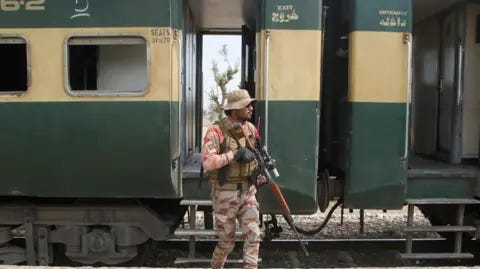
The Balochistan Train Hijacking Crisis
The March 11, 2025 hijacking of the Jaffar Express in Pakistan’s Balochistan province represents a critical flashpoint in the decades-long conflict between Baloch separatists and the Pakistani state-cum-military establishment. Orchestrated by the Baloch Liberation Army (BLA), the attack left 20 security personnel dead, 30 militants killed, and over 150 hostages rescued amid ongoing military operations. The crisis underscores the volatile intersection of ethnic insurgency, resource exploitation disputes, and historical grievances dating to Pakistan’s 1947 founding, when Balochistan’s forced and contentious annexation sowed seeds of rebellion. With the BLA threatening mass executions unless detained activists are released, and Pakistani forces encircling militants using suicide bombers as human shields, the standoff epitomizes the intractable nature of South Asia’s longest-running separatist conflict.
The Jaffar Express Hijacking: Timeline and Tactics
Attack Dynamics and Hostage Crisis
On March 11, 2025, BLA militants ambushed the Jaffar Express near Mashkaf, Bolan district, exploiting the mountainous terrain’s tunnel network. By detonating railway tracks, they derailed the Quetta-Peshawar train carrying hundreds of passengers. The assault involved the BLA’s elite Majeed Brigade (suicide squad), Fateh Squad (combat unit), and STOS (tactical wing), showcasing the group’s operational sophistication. Militants segregated captives: women, children, and Baloch civilians were released, while security personnel and non-Baloch passengers became bargaining chips.
Suicide Bombers and Military Counteroperations
By March 12, Pakistani forces reported killing 27–30 militants and rescuing 155–190 hostages. However, the presence of suicide bombers wearing explosive vests among hostages complicated rescue efforts. A security official noted, “Terrorists positioned suicide bombers next to innocent hostages, using them as human shields.” The BLA retaliated by threatening to execute hostages for every military strike, extending their ultimatum for prisoner exchanges.
Conflicting Narratives: State vs. Separatist Perspectives
Government of Pakistan’s Position
Islamabad frames the hijacking as a terrorism incident, emphasizing counterinsurgency successes. Officials accuse the BLA of exploiting Balochistan’s instability to sabotage China-Pakistan Economic Corridor (CPEC) projects, while dismissing negotiation offers as illegitimate. Military sources claim insurgents are splintering under pressure, though independent verification remains scarce.
Baloch Liberation Army’s Demands
The BLA, designated a terrorist group by Pakistan, the US, and EU, justifies the hijacking as retaliation for “75 years of Punjabi occupation and resource theft.” Spokesperson Jeeyand Baloch outlined demands: release of Baloch political prisoners, disclosure of forcibly disappeared activists, and cessation of military operations. The group rejects Pakistan’s statehood legitimacy, declaring, “We fight to reclaim Balochistan from an occupying regime.”
Historical Roots: From Kalat’s Annexation to Perpetual Insurgency
The 1947 Accession Controversy
Balochistan’s integration into Pakistan remains contentious. Pre-1947, the region comprised four princely states: Kalat (independent), Kharan, Las Bela, and Makran (under British suzerainty). Kalat’s ruler, Mir Ahmed Yar Khan, declared independence on August 15, 1947, after securing Muhammad Ali Jinnah’s legal endorsement. However, Jinnah reversed his stance, demanding Kalat’s accession by March 1948. When Yar Khan resisted, Pakistan annexed Kalat militarily on March 27, 1948, igniting the first Baloch insurgency under Prince Abdul Karim.
Instrument of Accession: Coercion Over Diplomacy
Declassified records reveal Jinnah’s duplicity: initially supporting Kalat’s sovereignty, he later orchestrated Kharan and Las Bela’s secession from Kalat to weaken its bargaining position. By March 1948, Pakistan Army troops massed along Kalat’s borders, compelling Yar Khan’s signature under duress. This “betrayal” entrenched Baloch perceptions of Punjabi domination, fueling recurrent rebellions in 1958, 1963, 1973, and 2003.
The Modern Insurgency: Grievances and Geopolitics
Resource Exploitation and Marginalization
Balochistan holds 65% of Pakistan’s natural gas, 80% of copper-gold reserves, and strategic Gwadar Port, yet remains Pakistan’s poorest province. Separatists accuse Islamabad of extracting billions annually in resources while allocating minimal royalties. The $62 billion CPEC, traversing Balochistan, exacerbates tensions as locals perceive it as colonial plunder benefiting China and Punjab.
BLA’s Evolution and Tactical Shifts
Founded in 2000, the BLA has transitioned from guerrilla attacks to high-profile assaults:
2004: Gas pipeline bombings disrupting supplies to Punjab
2018: Suicide attack on Chinese engineers in Gwadar
2024: Railway bridge explosions suspending Jaffar Express operations
The hijacking marks a tactical escalation, leveraging hostages to internationalize their cause while demonstrating military prowess.
Pakistan’s Double Standards on Kashmir vs. Balochistan
Islamabad frequently raises the issue of Kashmir on global platforms, portraying it as an unresolved dispute requiring international intervention. Pakistan advocates for Kashmiris' right to self-determination while simultaneously denying the same to the Baloch people. The hypocrisy is stark—Pakistan illegally annexed Balochistan in 1948 against the will of its sovereign and popular rulers, suppressing multiple indigenous uprisings with military force. While Pakistan harps on “human rights” in Kashmir, it remains silent on its own brutalities in Balochistan, where thousands of activists and civilians have been forcibly disappeared or extrajudicially executed.
Equally concerning is India’s diplomatic failure to expose Pakistan’s duplicity on international platforms. Despite Pakistan’s relentless lobbying against India on Kashmir—especially at the United Nations and Islamic summits—New Delhi has largely failed to counteract by highlighting the Balochistan issue. A more proactive Indian diplomatic stance, engaging international human rights organizations and media, could effectively turn the tables on Pakistan’s narrative and expose its contradictions on self-determination and territorial integrity.
Humanitarian and Strategic Implications
Civilian Vulnerabilities and Regional Security
The hijacking underscores Baloch civilians’ precarious position: used as shields by militants and collateral damage in military operations. With hostages still captive, families face psychological trauma amid opaque government communications. Regionally, the crisis risks destabilizing Pak-Iran-Afghan borders, where BLA allegedly shelters in Afghanistan.
Pakistan’s Counterinsurgency Dilemmas
Islamabad’s heavy-handed tactics—enforced disappearances, extrajudicial killings—have deepened alienation. The Commission of Inquiry on Enforced Disappearances documents thousands of unresolved Baloch cases, fueling recruitment for groups like BLA. Conversely, negotiating with militants risks legitimizing their demands and encouraging copycat attacks.
In Summary: A Nation Caught in the Fires of Its Own Making
The Jaffar Express crisis epitomizes Balochistan’s entrenched conflict cycle: state militarism begets insurgent radicalization, perpetuating violence. While Pakistan’s immediate priority is hostage rescue, any long-term resolution demands addressing historical injustices, equitable resource distribution, and meaningful political autonomy—issues that Islamabad has consistently ignored. However, with the BLA rejecting dialogue and Pakistan unwilling to acknowledge Baloch grievances, the stalemate is poised to escalate, further destabilizing the region.
Compounding Pakistan’s woes is the growing onslaught of Taliban attacks—both from within and across the porous Afghan border—targeting military and police establishments with increasing frequency. These attacks, along with the Baloch insurgency, underscore an uncomfortable truth: Pakistan, which for decades nurtured and weaponized extremist groups as instruments of strategic depth, is now facing a Frankenstein’s monster of its own creation. As the 48-hour ultimatum looms, the world watches whether this crisis will become a watershed moment in Balochistan’s long struggle or simply another chapter in Pakistan’s self-inflicted cycle of turmoil.
🔴 Balochistan in our thoughts: Our Resolve on Pakistan's Independence Day 🔴
Relentless State Terror: Pakistan’s War on Balochistan
Balochistan Exposes Pakistan's Double Standards on Kashmir
"Pakistan was born out of confusion, nurtured in paranoia, and sustained by fear." (Pervez Hoodbhoy, noted Pakistani nuclear physicist and activist)

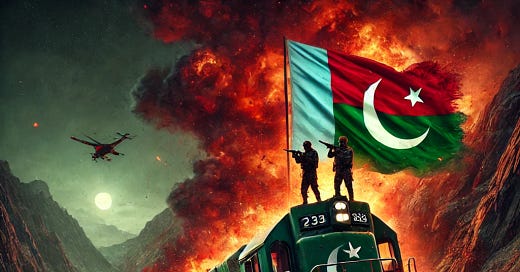


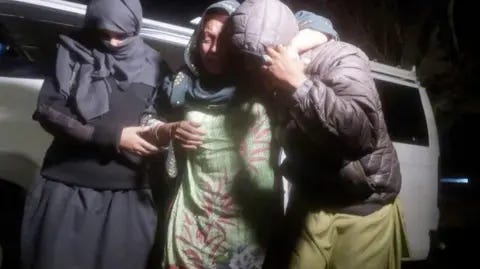

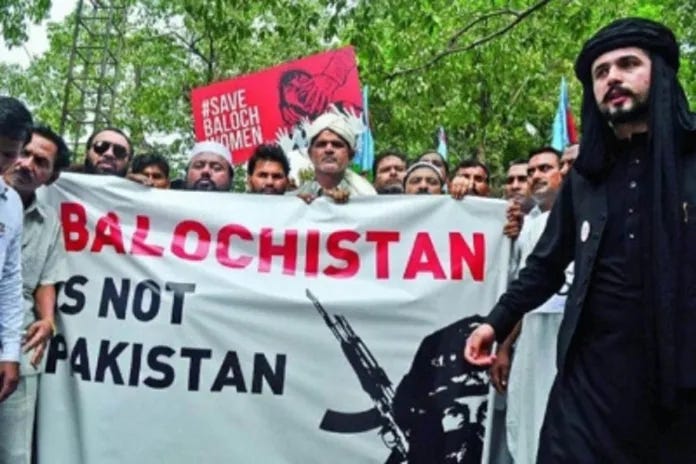
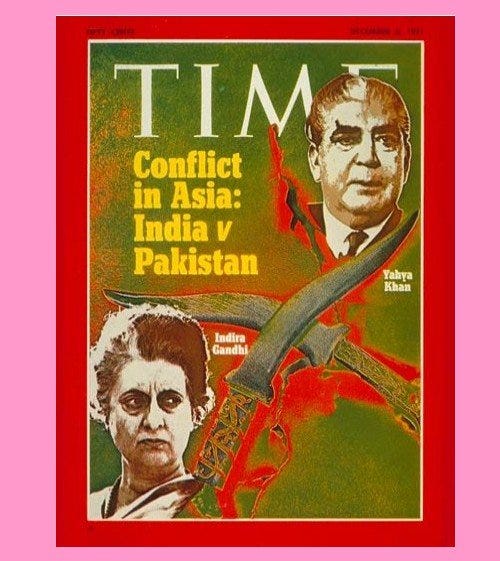
Hope Balochistan becomes independent soon. And if they're game, merge with Bharat.